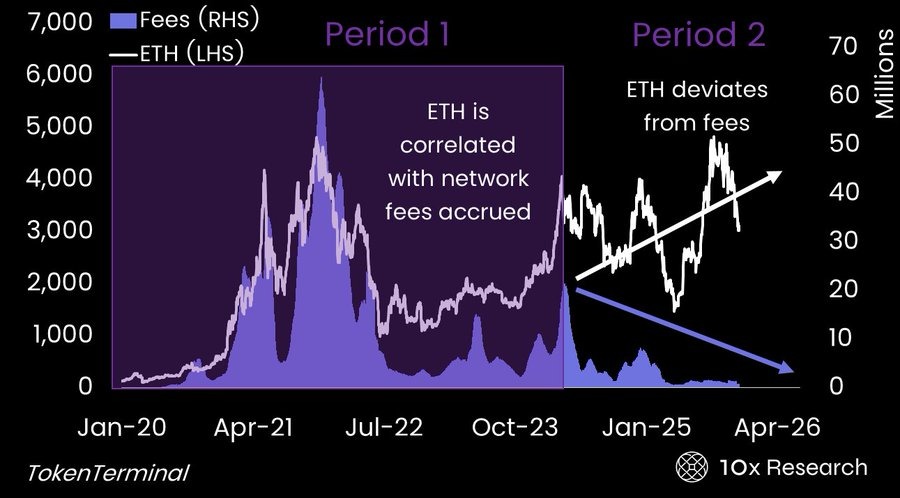Ethereum is once again under pressure, as ETH dropped to $2,700, an 8% in the last 24 hours. But, it is not just the price chart that is worrying traders. According to 10x Research, Ethereum’s biggest problem is its own network activity, which has stayed weak for nearly two years.
With fewer users, lower fees, and quiet DeFi activity, the Ethereum network is simply not earning the way it used to.
And now, this weak demand is now raising questions about how ETH should be valued going forward.
ETH Activity Has Fallen, Even With Lower Fees
ETH has always been strongly connected to network demand. In 2020–2021, people rushed into DeFi, NFTs, staking, and crypto gaming, which pushed ETH fees very high. Those high fees helped ETH stay strong even when the market was weak.
But since mid-2024, things have gone in the opposite direction.
Even though fees are now cheaper and many users have moved to Layer-2 networks like Arbitrum, Optimism, and Base, activity on Ethereum’s main network has not picked up.
DeFi usage is still weak, NFT trading is a fraction of what it used to be, and overall fee generation has dropped sharply.
It’s now been almost two years of weak network demand, and that weakness is clearly showing in ETH’s price today.

Net Inflation Is Rising Again
Ethereum was expected to become “deflationary,” burning more ETH than it creates. But in the last three years,
- 4.2 million ETH issued in the last 3 years
- Only 3.5 million ETH were burned
That means Ethereum has become net inflationary, mainly because the burning is not enough to cancel new supply.
Can Ethereum Price Recover?
According to 10x Research, price recovery depends on real usage, not just hype. Two things could pull ETH back up:
However, 10x Research notes two possible paths forward that could push ETH price up.
- First the regulatory clarity in the United States, unlocking institutional DeFi participation
- Secondly, a new wave of Web3 activity, which could bring back higher fees and stronger usage.
Until then, the market may continue to treat Ethereum like a speculative asset rather than a productive network.
Trust with CoinPedia:
CoinPedia has been delivering accurate and timely cryptocurrency and blockchain updates since 2017. All content is created by our expert panel of analysts and journalists, following strict Editorial Guidelines based on E-E-A-T (Experience, Expertise, Authoritativeness, Trustworthiness). Every article is fact-checked against reputable sources to ensure accuracy, transparency, and reliability. Our review policy guarantees unbiased evaluations when recommending exchanges, platforms, or tools. We strive to provide timely updates about everything crypto & blockchain, right from startups to industry majors.
Investment Disclaimer:
All opinions and insights shared represent the author’s own views on current market conditions. Please do your own research before making investment decisions. Neither the writer nor the publication assumes responsibility for your financial choices.
Sponsored and Advertisements:
Sponsored content and affiliate links may appear on our site. Advertisements are marked clearly, and our editorial content remains entirely independent from our ad partners.





